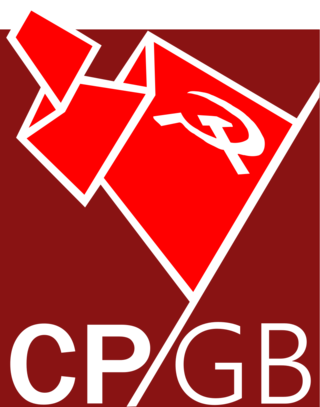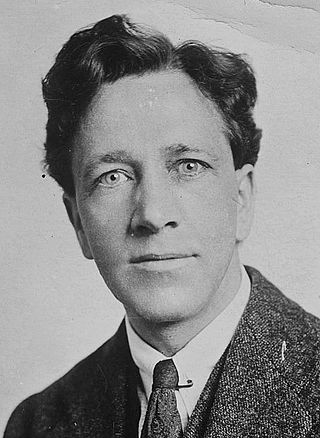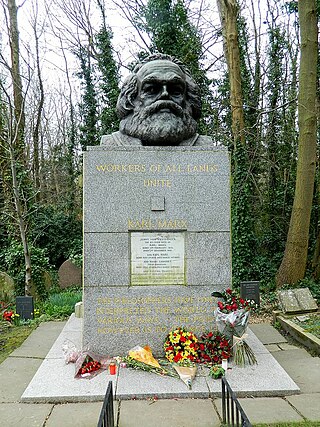Related Research Articles

The Communist Party of Great Britain is a political group which publishes the Weekly Worker newspaper. The CPGB (PCC) claims to have "an internationalist duty to uphold the principle, 'One state, one party'. To the extent that the European Union becomes a state then that necessitates EU-wide trade unions and a Communist Party of the EU". In addition, it is in favour of the unification of the entire working class under a new Communist International. It is not to be confused with the former Communist Party of Great Britain, the Communist Party of Great Britain (Marxist–Leninist), or the current Communist Party of Britain.

The Workers' Socialist Federation was a socialist political party in the United Kingdom, led by Sylvia Pankhurst. Under many different names, it gradually broadened its politics from a focus on women's suffrage to eventually become a left communist grouping.

The Communist Party (British Section of the Third International) was a Left Communist organisation established at an emergency conference held on 19–20 June 1920 at the International Socialist Club in London. It comprised about 600 people.

Arthur MacManus was a Scottish trade unionist and communist politician.
John Thomas Murphy was a British trade union organiser and Communist functionary. Murphy is best remembered as a leader of the communist labour movement in the United Kingdom from the middle 1920s until his resignation from the Communist Party of Great Britain in 1932.

The Communist League was a small far-left organisation in the United Kingdom which existed during the year of 1919. Its stated goal was to establish a network of workers' councils that would "resist all legislation and industrial action directed against the working class, and ultimately assuming all power, establish a working class dictatorship".
The South Wales Socialist Society was a federation of communist groups in Wales, with many of its members being coal miners. It was a founder constituent of the Communist Party of Great Britain.

Albert Samuel Inkpin, was a British communist and the first General Secretary of the Communist Party of Great Britain (CPGB). He served several terms in prison for political offences. In 1929 he was replaced as head of the CPGB and made head of the party's Friends of Soviet Russia organisation, a position he retained until his death.
Thomas Hargrave Bell was a Scottish socialist politician and trade unionist. He is best remembered as a founding member of both the Socialist Labour Party and the Communist Party of Great Britain and as the editor of Communist Review, the official monthly magazine of the latter.
The Workers' Weekly was the official newspaper of the Communist Party of Great Britain, established in February 1923. The publication was succeeded by Workers' Life in January 1927 following a successful libel action against the paper. This was in turn replaced by The Daily Worker on the first day of January 1930.

The Socialist Labour Party was a socialist political party in the United Kingdom. It was established in 1903 as a splinter from the Social Democratic Federation (SDF) by James Connolly, Neil Maclean and SDF members impressed with the politics of the American socialist Daniel De Leon, a Marxist theoretician and leading figure of the Socialist Labor Party of America. After decades of existence as a tiny organisation, the group was finally disbanded in 1980.
The Communist Unity Group (CUG) was a small communist organisation in the United Kingdom.
The Communist Labour Party was a communist party in Scotland. It was formed in September 1920 by the Scottish Workers' Committee and the Scottish section of the Communist Party, some members of the Socialist Labour Party (SLP) and various local communist groups. In the same month, the Communist Party of South Wales and the West of England was founded, with a very similar programme.

The British Socialist Party (BSP) was a Marxist political organisation established in Great Britain in 1911. Following a protracted period of factional struggle, in 1916 the party's anti-war forces gained decisive control of the party and saw the defection of its pro-war right wing. After the victory of the Bolshevik Revolution in Russia at the end of 1917 and the termination of the First World War the following year, the BSP emerged as an explicitly revolutionary socialist organisation. It negotiated with other radical groups in an effort to establish a unified communist organisation, an effort which culminated in August 1920 with the establishment of the Communist Party of Great Britain. The youth organisation the Young Socialist League was affiliated with the party.
Fred Shaw was a British socialist activist and trade unionist.
Frederick Harold Peet was a British communist activist.

Far-left politics in the United Kingdom have existed since at least the 1840s, with the formation of various organisations following ideologies such as Marxism, revolutionary socialism, communism, anarchism and syndicalism.
Edgar Thoreau Whitehead (1890–1956) was a British political activist, who served on the executive of the Communist Party of Great Britain but later became a fascist.
William Thomas Edward Brain was a British socialist activist.
William James Hewlett was a British trade unionist and socialist activist.
References
- 1 2 McIlroy, John; Campbell, Alan (2020-11-01). "The early British Communist leaders, 1920–1923: a prosopographical exploration". Labor History. 61 (5–6): 423–465. doi:10.1080/0023656X.2020.1818711. S2CID 225166906.
- ↑ "CPGB: Provisional Executive Committee". www.marxists.org. Marxists Internet Archive. Retrieved 21 May 2021.
- ↑ Inkpin, Albert (1920). "Communist Conference". The Communist (5 August, 1920).
- ↑ Inkpin, Albert (1920). "Secretary's Report". Communist Unity Convention: Official Report.